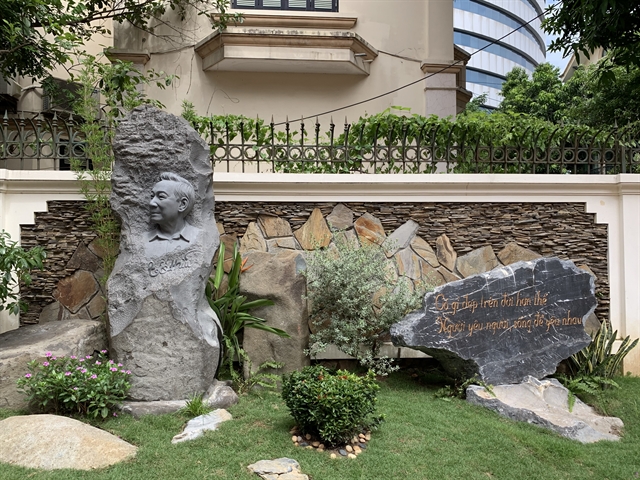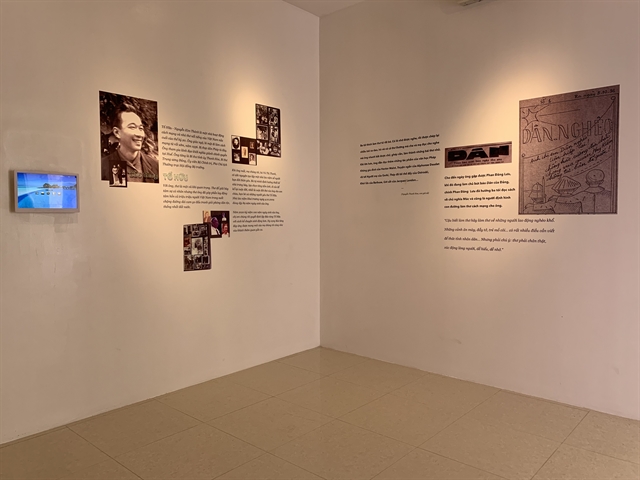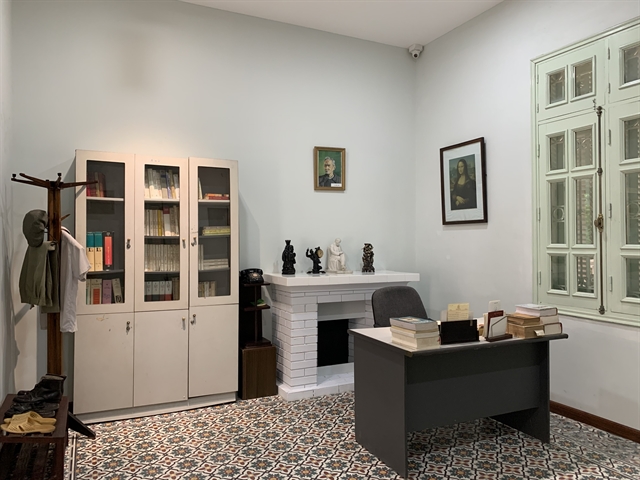
A bas-relief of poet Tố Hữu at the Tố Hữu Museum. Photo courtesy of the museum
HÀ NỘI - A museum dedicated to Việt Nam’s most celebrated revolutionary poet Tố Hữu opens tomorrow, giving visitors the chance to learn about Vietnamese history in the 20th century.
The museum showcases thousands of photos, objects and documents, from drafts of his famous poems, to the pens he used to compose poems, as well as his working desk and tea table where he used to sit and discuss poetry with his friends.
The museum has been transformed from the original memorial house that was founded in 2009, seven years after his death, by his wife and his three children to commemorate their beloved husband and father.
“The original memorial house can’t offer enough space for a huge number of his documents and photos. In addition, the ‘traditional’ method of displaying couldn’t effectively offer visitors an overview of his whole life and revolutionary career,” the poet’s youngest daughter, Nguyễn Minh Hồng, told Việt Nam News.
She said her family has been working on transforming the venue for two years.
“We were quite confused as we didn’t find the answer to our problem – to present everything we have in the limited area of the venue. We finally seemed to find the solution after we visited a private museum dedicated to historian and cultural researcher Nguyễn Văn Huyên in Hà Nội’s Hoài Đức suburban district,” the woman, who is an IT professor, said.
With advice from the former director of the Việt Nam Museum of Ethnology, Dr Nguyễn Văn Huy, the son of historian Huyên, the first ideas for a new concept of a museum dedicated to poet Tố Hữu were born.
“However, it took us one and a half years until we could finalise all the ideas,” Hồng said.

A corner of the Tố Hữu Museum. Photo courtesy of the museum
Involved with the project” since the beginning, Dr Huy said the most important thing is that “you need to understand that person very well to be able to work on the project”.
According to him, Tố Hữu is not only a poet but also a great revolutionary, who, since a very young age, devoted himself to the national cause of winning independence.
“His poems aim to serve the revolutionary cause. His most famous poems were inspired by or related to historical events of the country, ” Huy said.
Huy and his team of museum experts had to find creative ways, using audio, videos and interactive screens, to represent the life and career of Tố Hữu from his birth in 1920 until his death in 2002.
Together with original drafts, his poem collections, and photos, visitors can learn about how Tố Hữu got involved with poetry, why his poems engage closely in the revolutionary cause, and why his compositions motivated Vietnamese soldiers and people during the fight for independence.
“As most of his poems are engaged with major historical and political events of the country, it can be said part of the history has been reflected through his life and works. That’s why we want to present his life in the most honest way,” Huy said.
“We let the poet ‘tell’ visitors by himself about his works, through the words he wrote in his memoir or through conversation with his beloved wife,” he added.
Visitors can also listen to recitals of his famous poems through an audio system set up in the venue.
The poet’s living and working spaces at his house at 76 Phan Đình Phùng Street have also been reproduced in the museum.

The poet's working space has been reproduced at Tố Hữu Museum. Photo courtesy of the museum
“We retained the exact furniture layout with original items and objects as they were in our house, where we lived together with our father during more than 40 years," Hồng said.
The Tố Hữu Museum, which is to celebrate 100th birthday of the poet, is located at D9 Thăng Long International Village, Hà Nội. After the opening day on Sunday, the free entry museum will open to the public every Saturday, from 9am to 5pm.
A revolutionary poet
Tố Hữu was born on October 4, 1920 in the imperial capital city of Hue as Nguyễn Kim Thành. At the age of 13, Tố Hữu went to Quốc Học Huế High School. It was there he started to learn about the plight of his country and Communist ideology. He soon became a leader in the Democratic Youth League in Huế and in 1938 he was admitted to the Indochinese Communist Party.
In April 1939, he was arrested by the French colonial authorities and detained in several prisons in the central region. However, in March 1942, he escaped and continued his revolutionary activities before successfully contacting a Party organisation operating in Thanh Hóa Province.
Three years later, in August 1945, Tố Hữu was elected as chairman of an Insurrection Committee in Huế. A year later, when the anti-French Resistance War broke out, he was sent back to Thanh Hóa as the provincial Party Committee Secretary. In 1947, once again, he was asked to serve in a new position – this time as the manager of arts and culture activities of the Hồ Chí Minh government following the victory of the August Revolution in 1945.
Tố Hữu's development as a poet and his revolutionary activities were intertwined. His poems were first carried in newspapers produced by the Democratic Front and his work reflected a new voice in the contemporary poetry scene at that time in Việt Nam.
Tố Hữu wrote poems for the people. He wrote about subjects that were close to the hearts of ordinary people, and much of his work explored the anguished and hard life of his fellow countrymen who lived under the yoke of the French colonialists and their henchmen. Tố Hữu was considered Việt Nam's first Communist poet, and he also breathed new life into poetry and the development of arts in the country. VNS
OVietnam